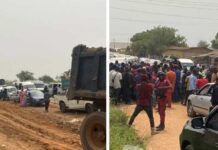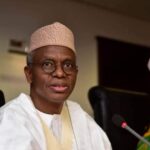President Bola Ahmed Tinubu on Thursday reaffirmed his administration’s commitment to building an inclusive, productive, and secure Nigeria, declaring that the task of national development is a collective responsibility shared by all citizens.
The President made the assertion while addressing members of Course 33 of the National Defence College (NDC) at the Council Chambers of the State House, Abuja, where he commended them for their patriotism, discipline, and contributions to national discourse throughout their programme.
President Tinubu emphasized that Nigeria must fully utilise its human, material, and intellectual capital to achieve industrialisation, peace, and long-term prosperity. He urged the participants to see themselves as strategic partners in shaping Nigeria’s future.
“We are building a political, economic, and security future here. We must develop Nigeria,” he stated. “It is our joint responsibility to ensure that this nation is productive, governed inclusively, and able to secure the future of generations yet unborn.”
Responding to the course’s research paper titled “Harnessing Indigenous Manufacturing for Enhanced National Security by Year 2040,” President Tinubu described the recommendations as insightful and assured the group that his administration would carefully study them for possible implementation.
He further noted that his government remains committed to empowering defence and security institutions to produce highly trained officers capable of strengthening national power in an evolving security environment.
“We must develop future strategic leaders equipped with the knowledge and analytical skills to enhance national power,” he said. “We must also be resilient, forward-looking, and curious about what other nations are doing and how we can adapt.”
On the infrastructural expansion of the NDC, President Tinubu urged patience, noting that government is aware of the long-standing request for the full development of the college’s permanent site.
Earlier, the Commandant of the College, Rear Admiral A. Ahmed, highlighted the institution’s pivotal role since its establishment in 1992 as the nation’s premier military educational institution. He noted that Course 33 comprised 99 participants from the Nigerian military, police, MDAs, and 23 international officers from Africa, Asia, and South America.
Ahmed explained that the course theme—“Strengthening Institutions for National Security and Development in Nigeria”—aligns with the administration’s Renewed Hope Agenda, especially in the areas of industrialisation, digitalisation, and national security.
He revealed that study teams visited 23 countries to examine indigenous manufacturing systems, with Qatar offering particularly valuable insights due to its successful economic diversification from a mono-economy. The team also praised Nigeria’s improved economic outlook, noting that only two countries have better GDP growth projections for 2026.
Among their recommendations were massive infrastructural investments, stronger product standardisation, and increased support for the Defence Industrial Corporation of Nigeria (DICON). The team also called for the launch of Project Native 2040 to drive indigenous manufacturing for national security.
The event ended with a pledge by the President’s Special Adviser on Information and Strategy, Bayo Onanuga, that the administration would continue to foster policies that support industrialisation, security, and sustainable national growth.
Source: Daily Review










